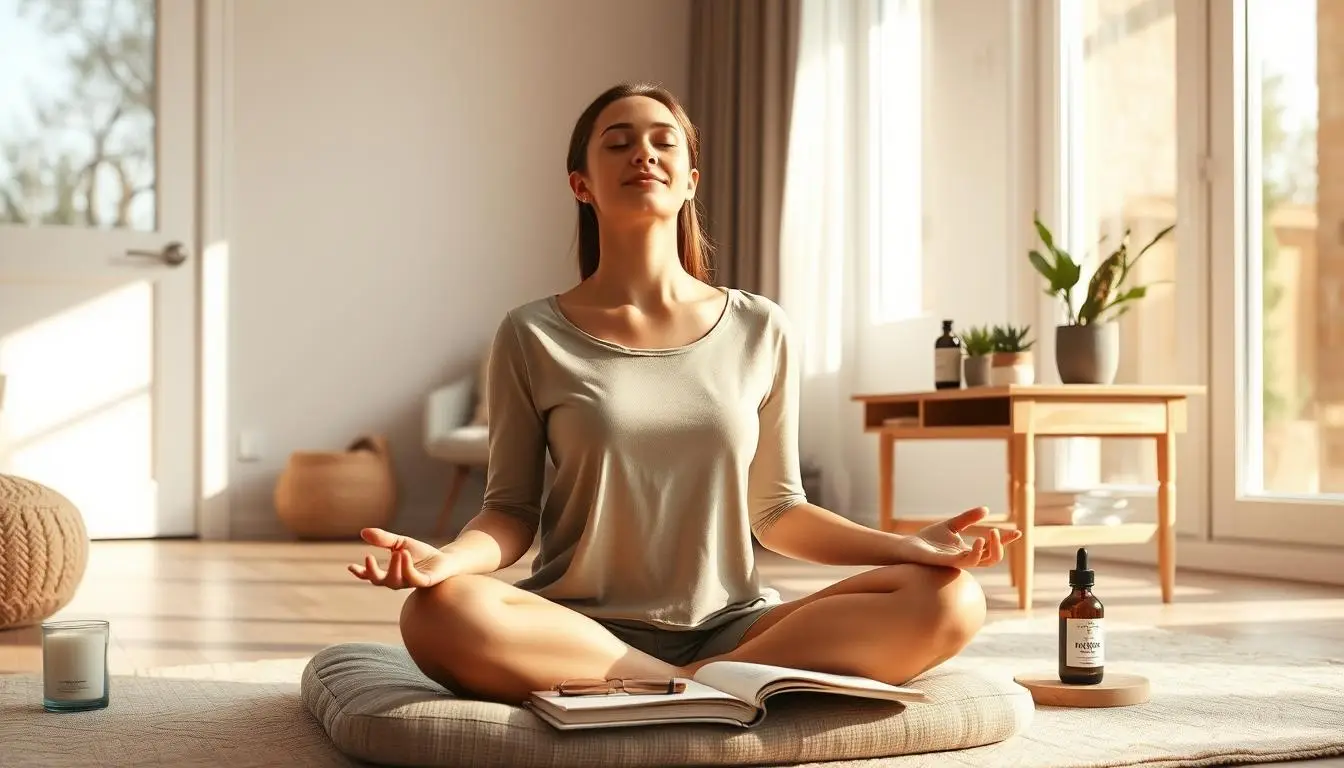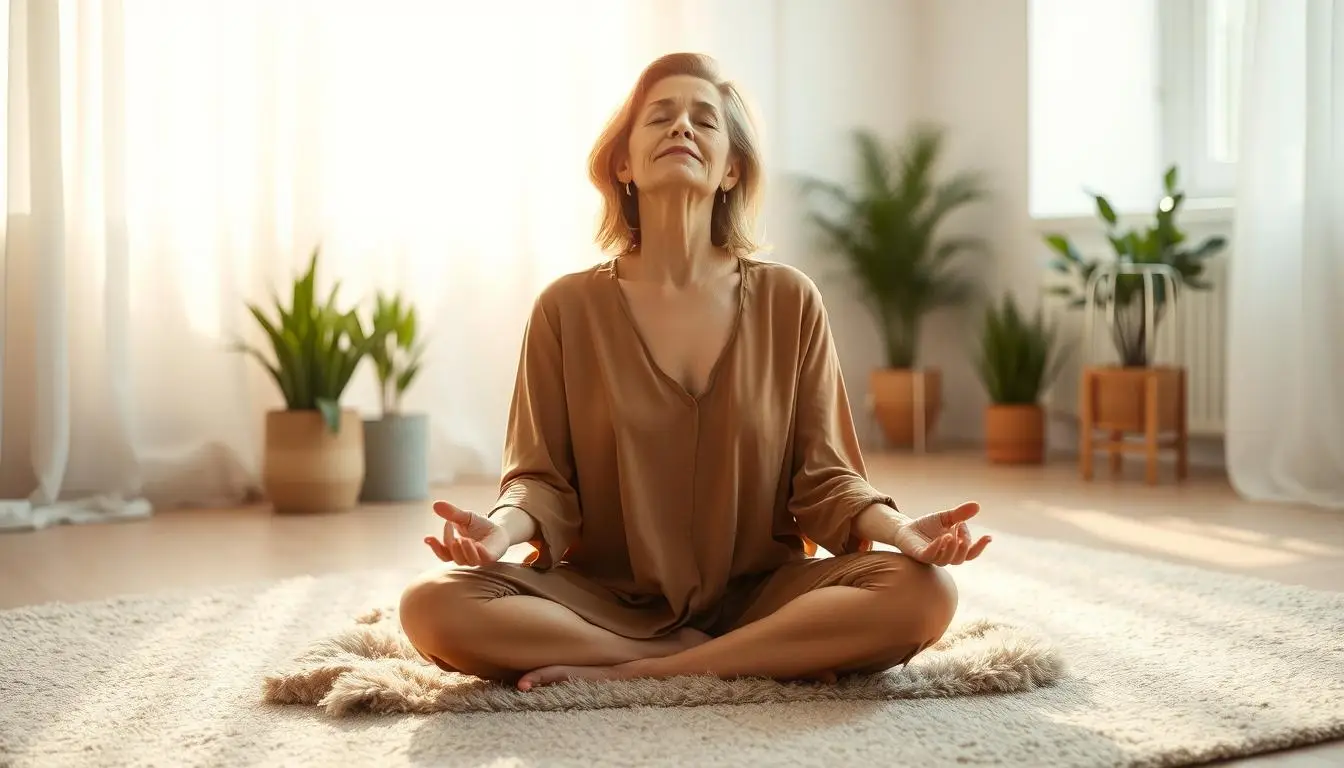Did you know that the average person has approximately 6200 thoughts a day? This points to just how busy our minds can become. No wonder some of us struggle to calm our minds. This article will focus on 10 ways for relax your mind and relieving stress. Our goal is to assist you in obtaining the relaxation that you need.
When your thoughts are racing, it can make your feel overwhelmed and anxious. Quieting your mind to some extent or practice in that direction is fundamental for mental health. We’ll share easy tips to help you to clear your mind and find calm, even when life gets chaotic.
These techniques will help you to de-stress, ranging from basic breathing practice to create a harmonious environment. Whether it’s work stress, personal worries, or just needing a break, these strategies can help you find peace.
Key Takeaways
- Understand the impact of racing thoughts on mental health
- Learn practical techniques to calm your mind
- Discover physical activities that promote mental clarity
- Create a relaxing environment for better peace of mind
- Develop daily habits for long-term mental relaxation
Understanding the Impact of Racing Thoughts on Mental Well-being
Racing thoughts can have a significant impact on mental health because they disrupt the mind’s natural rhythm, creating a loop of stress and exhaustion. When thoughts come at a relentless pace, it’s tough to concentrate, find peace, or even rest. Racing thoughts often feed into anxious or fearful thinking, amplifying worries and making problems seem larger than they really are. This kind of mental noise doesn’t just drain your energy, it can affect your mood, making you feel tense, frustrated, or even helpless. Over time, if racing thoughts go unchecked, they can contribute to issues like anxiety, depression, and even impact sleep, which is vital for mental well-being. Finding ways to slow down and manage these thoughts, like practicing mindfulness or breathing exercises, can help restore a sense of calm and balance to the mind.
How Stress Affects Your Brain and Body
Stress doesn’t only influence your mood, it also has a very strong effect on your brain and body. Normally, when you are stressed your body releases hormones such as cortisol and adrenaline for “fight or flight.” These hormones can be useful in the short term, as they provide you with a boost of energy and concentration. However, if you keep on being stressed out these hormones have a negative effect. Elevated cortisol over time destroys parts of the brain associated with memory and emotion, increasing difficulty in logical thought and self-soothing. The physical effects of stress include headaches, digestive upset, tensing up of muscles and can also reduce our immunity, which increases the chances of illness. Given your body is strong, but chronic stress can take its toll on your mind and body, making it difficult to escape the vicious circle. And this is why stress management techniques – including relaxation, exercise or even just self-care – are vital for body and mind.
When your body is stress, your body will starts a chain of physical reactions:
- Increased heart rate
- Rapid breathing
- Muscle tension
- Weakened immune response
Recognizing the Signs of Mental Overwhelm
Mental overwhelm shows up in different ways. You might find it hard to focus, get irritable, have trouble sleeping, or feel extremely tired. Spotting these signs is important for taking care of your mental health.
The Science Behind Stress Response
Your body’s stress response is quite complex. When you see a threat, your brain goes into “fight or flight” mode. This releases cortisol, the main stress hormone. While it’s good in danger, too much can harm your health.
Knowing how this works helps you manage stress. Methods like cognitive behavioral therapy can teach you to deal with stressors. This can lessen the negative effects of racing thoughts on your mental health.
Things to Do to Relax Your Mind: Essential Techniques
Keeping your mind relaxed is crucial for your mental health. Let’s look at some effective ways to calm your mind and lower your stress. These techniques are simple to learn and can be done anywhere.
Mindfulness and Meditation Practices
Mindfulness keeps you in the moment and focused. Begin with short sessions, focusing on your breath. Sit comfortably, close your eyes, and watch your thoughts without judgment. Meditation can lessen anxiety and boost your overall well-being.

Deep Breathing Exercises for Instant Calm
Deep breathing exercises are quick and effective for relaxation. Try the 4-7-8 technique: Inhale for 4 seconds, hold for 7, and exhale for 8. Do this cycle 4 times. It slows your heart rate and brings calmness.
Progressive Muscle Relaxation Methods
Progressive muscle relaxation eases physical tension. Begin at your toes, tense each muscle group for 5 seconds, then relax for 10 seconds. Move up your body until you reach your head. This method helps you find and release hidden tension.
Guided Visualization Techniques
Visualization takes your mind to a peaceful place. Close your eyes and imagine a calm location. Use all your senses: What do you see, hear, smell, and feel? This mental escape can greatly reduce stress.
- Practice mindfulness daily
- Use deep breathing during stressful moments
- Incorporate muscle relaxation before bed
- Try guided visualization during breaks
Regularly practicing these relaxation techniques can greatly improve your mental well-being. Remember, being consistent is key to enjoying the full benefits of these methods.
Physical Activities That Promote Mental Clarity
Exercise is a great way to relax your mind and boost mental clarity. Walking or running releases endorphins, which are natural mood boosters. These chemicals help lower stress and anxiety, giving you a “runner’s high.”
Strength training is also good for your mind. It builds confidence and improves how you see yourself. Lifting weights also makes your mind stronger, helping you focus and overcome challenges.
High-intensity interval training (HIIT) is another great choice for mental clarity. It involves short, intense workouts followed by rest. HIIT can improve your thinking and reduce depression symptoms. Plus, it’s quick and can be done at any fitness level.
Yoga combines physical movement with mindfulness, making it a powerful tool for mental relaxation. It teaches deep breathing, flexibility, and balance. These skills help lower stress and improve mental clarity.
| Activity | Mental Benefits | Physical Benefits |
|---|---|---|
| Walking/Running | Releases endorphins, reduces stress | Improves cardiovascular health |
| Strength Training | Builds confidence, improves focus | Increases muscle strength and bone density |
| HIIT | Enhances cognitive function | Boosts metabolism, improves endurance |
| Yoga | Promotes mindfulness, reduces anxiety | Increases flexibility, improves balance |
Adding these activities to your routine can greatly improve your mental clarity and well-being. Choose exercises you like, as regular practice is essential for lasting benefits.
Creating a Calming Environment for Mental Peace
Your surroundings are key to relaxation. By making a peaceful space, you can calm your mind. Let’s look at how to make a calm corner in your home.
Setting Up Your Personal Relaxation Space
Find a quiet spot in your home. Add soft lights, comfy seats, and warm blankets. Keep it tidy. This special area tells your brain it’s time to relax.

Using Sound and Music for Relaxation
Music can calm your busy thoughts. Make a playlist with calming songs. Nature sounds, classical, or ambient music are great. Each song should help you relax and clear your mind.
- Ocean waves
- Gentle rain
- Soft piano melodies
- Wind chimes
Incorporating Natural Elements
Bring nature inside to enhance your space. Add plants, a small fountain, or a himalayan salt lamp. These elements can purify the air and create a peaceful vibe.
“Nature itself is the best physician.” – Hippocrates
By mixing these elements, you’ll create a peaceful haven. Your space should reflect what brings you peace. Try different things until you find what works best for you.
Daily Habits for Long-term Mental Relaxation
Building daily habits is crucial for lasting mental calm. Simple practices can boost your well-being and improve mood and productivity.
Establishing a Mindful Morning Routine
Begin your day with purpose. Wake up early for quiet reflection. Keeping a gratitude journal helps focus on the good in your life.
Digital Detox Strategies
Too much digital connection can stress your mind. Set times for emails and social media. Use apps to control screen time and make tech-free areas at home.
Healthy Sleep Practices
Good sleep is vital for mental calm. Keep a regular sleep schedule and a soothing bedtime routine. Avoid screens before bed and keep your room cool and dark.
- Stick to a regular sleep schedule
- Create a calming pre-bed routine
- Optimize your sleep environment
Adding these habits to your daily life is an investment in your mental health. Start small and gradually add these practices for lasting benefits.
FAQ
Q: What are some effective ways to calm your mind during a stressful situation?
A: Focusing on the present moment and taking deep breaths are effective ways to calm your mind during a stressful situation. Breathing helps lower your heart rate and redirect your thoughts to something more peaceful.
Q: How can meditation help reduce feelings of stress?
A: Meditation helps in calming both your body and mind, allowing you to stay centered and less stressed. It encourages you to let go of negative thoughts and focus your thoughts on the present moment, providing stress relief.
Q: What are 10 tips for staying calm in stressful situations?
A: The 10 tips include deep breathing, meditation, taking breaks, talking to a trusted friend, engaging in something creative, listening to music, exercising, practicing self-compassion, reducing sugar and processed foods, and getting restorative sleep. These can help you cope with stress and change your life for the better.
Q: How does listening to music help you feel more relaxed?
A: Listening to music can make us feel relaxed by soothing our body and mind. It helps reduce feelings of stress and can be one of the best ways to recover from the stress of a long day.
Q: Can talking to a trusted friend help you calm down?
A: Yes, talking to a trusted friend can help you feel less isolated and provide emotional support that is crucial for stress relief. Sharing your feelings and getting thoughts out of your head can significantly help calm you down.
Q: Why is engaging in something creative beneficial for stress relief?
A: Engaging in something creative helps redirect your thoughts from unhelpful patterns to more constructive ones. It allows you to express yourself and can be a fulfilling way to help calm your mind.
Q: How do sugar and processed foods affect stress levels?
A: Consuming high levels of sugar and processed foods can make us feel more anxious and stressed. Reducing these in your diet is beneficial for your behavioral health and can help you feel calmer overall.
Q: How can practicing self-compassion help you cope with stress?
A: Practicing self-compassion involves treating yourself with kindness and understanding, which can help reduce stress. Accepting that it’s okay to feel stressed allows you to recover from the stress more effectively and promotes overall wellbeing.
Q: What role does exercise play in helping you calm your mind?
A: Exercise is one of the best ways to help you feel more relaxed and reduce stress. Physical activity releases endorphins, which improve your mood and help calm your body and mind.
Q: How can taking deep breaths change your response to stress?
A: Taking deep breaths can help reduce immediate feelings of stress by lowering your heart rate and promoting a sense of calm. It’s an easy and quick technique to use the next time you feel overwhelmed.
Conclusion
Finding ways to relax is key for your mental health. Try out the techniques we’ve shared to calm your mind and shift your focus away from stress. Remember, what relaxes you might not relax someone else. So, try different methods to find what works best for you.
Adding these practices to your daily life can help you deal with challenges better. Whether it’s deep breathing, mindfulness, or making a peaceful space, each method can lead to mental clarity. As you make these habits a part of your life, you’ll see how they improve your stress handling.
Making mental relaxation a priority is more than just feeling good now. It’s an investment in your long-term well-being that can really change your life. By using these techniques regularly, you’re building strength and enhancing your life quality. Start with small steps, be patient with yourself, and see how these simple practices change your stress and relaxation approach.








